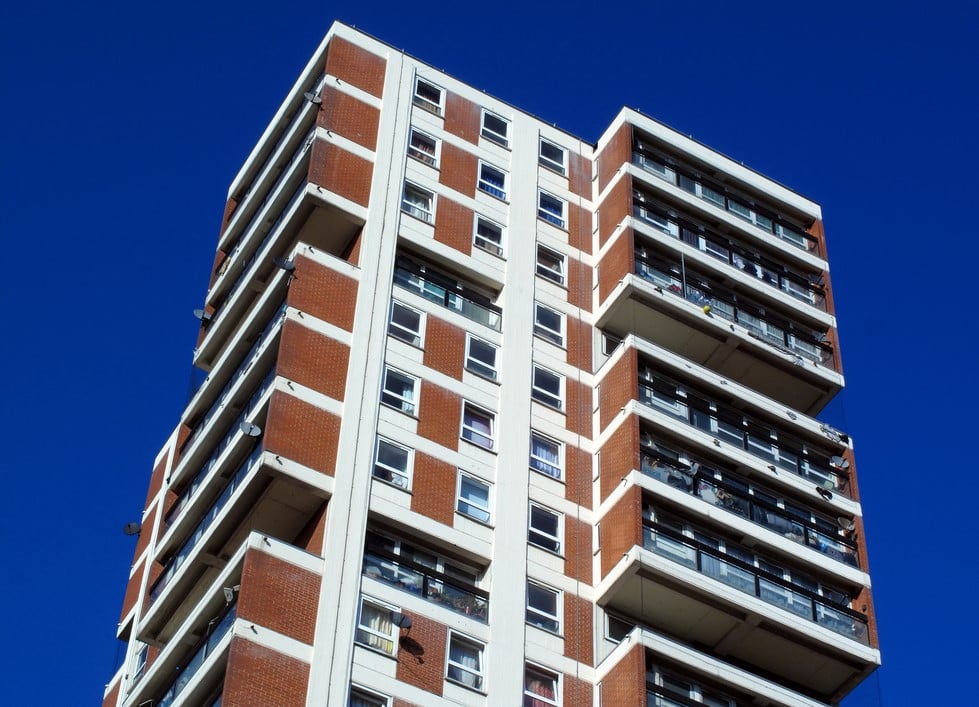
9:28 AM, 20th February 2024, About 11 months ago 2
Text Size
If you own a block of flats and rent them out to tenants, you may need a special type of insurance to protect your property and your liability. This is called block of flats insurance – sometimes referred to as ‘block insurance’ – and it is designed to cover the specific risks and challenges that landlords of multi-unit buildings face.
Block insurance is a form of property insurance that covers the entire building and its common areas, such as hallways, staircases, lifts, gardens and car parks. It is different from individual flats insurance, which only covers the contents and fixtures of a single flat.
Blocks of flats range from a converted terrace with an upstairs and downstairs flat; through to high-rise blocks of flats with dozens of flats.
Residents Management Companies can take on the insurance requirements but usually, it remains the freeholder who will arrange and supply insurance. This is currently undergoing legal change in the wake of the Grenfell tragedy; allowing residents and leaseholders much more influence on the insurance and to be named as interested parties. The idea is to stop exorbitant insurance costs from being charged/profiteering – where the freeholder or management company adds enormous fees for doing very little or the broker earns unreasonable sums in commission.
Block insurance usually includes liability insurance, which protects against compensation claims should someone be injured, or their property is damaged on the premises. This can be useful if you are sued by a tenant, a visitor, a contractor, or a member of the public.
As a landlord (management company or leaseholder), you are responsible for insuring the buildings and the common areas of your block of flats.
This is because you have a duty of care to your tenants/residents and anyone else who enters your property. If something goes wrong, such as a fire, a flood, a burglary, or should someone slip and falls, you could be held liable for the damages and losses.
Without block insurance, you would have to pay for the repairs and replacements out of your own pocket, which could be very expensive.
You could also face legal action and hefty fines if you are found to be negligent or in breach of regulations. Public liability insurance may help you here. Management Companies can also buy Director and Officers insurance to assist here as well.
Block of flats insurance can help you avoid these risks and costs by providing financial protection and peace of mind.
It can also help you comply with the terms and conditions of your mortgage lender, if you have one, and your leaseholders, if you are part of a management company.
Block insurance can cover a range of perils and events that could damage your property or cause injury to someone. Some of the common coverages include:
The cost of block insurance depends on various factors, such as:
To get an accurate quote for your block of flats insurance, you need to provide these details to your insurer or broker. You can also compare quotes from different providers to find the best deal for your needs and budget.
Finding the best block insurance for landlords can be challenging, as not all insurers offer this type of cover. You may need to shop around and compare different options to find the one that suits your situation and preferences.
One way to make this process easier and faster is to use The Home Insurer to help landlords find the best block insurance from a range of UK providers. Given the complexity of this sort of insurance, it is best to call for a discussion and quote on 01832 770965.
For more help and advice about landlord insurance, contact the team The Home Insurer:
Previous Article
How do I fill in the Warrant of Possession section 4 details?Next Article
Quadruple surge in fake tenancy applications
JB
Become a Member
If you login or become a member you can view this members profile, comments, posts and send them messages!
Sign Up14:31 PM, 21st February 2024, About 11 months ago
My understanding is that block liability insurance only covers liability in the communal parts. Therefore, landlords need to purchase extra insurance for liability cover within their flat
Jason McClean - The Home Insurer
Become a Member
If you login or become a member you can view this members profile, comments, posts and send them messages!
Sign Up9:37 AM, 26th February 2024, About 11 months ago
Hi JB
Property owner’s liability will normally cover anything to do with the communal building. If a tile falls off the roof and hits a car, then that is usually covered.
You are right; inside the flat, the landlord will need to protect their own liability. If there is a ripped carpet supplied by the landlord and someone trips on it, then the landlord will be liable, not the block insurance.
Most landlords will take out minimal £5k contents insurance to access the £2million liability associated with it. These sorts of polices are usually £100 or less for the year.
All the best,
Jason